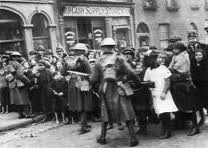 The Easter Rising was an rebellion staged in Ireland, by Irish republicans seeking the end of British rule in Ireland and establishing the Irish Republic. Over a six day period during Easter week, Easter Monday 24 April to 30 April 1916, more than 250 civilians were killed, 28 of who were children aged between two and 16. A lecturer at the Maynooth’s National University of Ireland, Dr. Anne Matthews has suggested that the children be in remembered the in the 2016 centenary. She said that the children or their mothers had had not been remembered simply due to their social class. Matthews made the statement at the Parnell Summer School in County Wicklow, where she was speaking on a panel regarding equality and the Irish Revolution.
The Easter Rising was an rebellion staged in Ireland, by Irish republicans seeking the end of British rule in Ireland and establishing the Irish Republic. Over a six day period during Easter week, Easter Monday 24 April to 30 April 1916, more than 250 civilians were killed, 28 of who were children aged between two and 16. A lecturer at the Maynooth’s National University of Ireland, Dr. Anne Matthews has suggested that the children be in remembered the in the 2016 centenary. She said that the children or their mothers had had not been remembered simply due to their social class. Matthews made the statement at the Parnell Summer School in County Wicklow, where she was speaking on a panel regarding equality and the Irish Revolution.
The children “who lived and died in the city” were from “working-class backgrounds” and “are still not considered worthy of a commemorative plaque,” Matthews said (Irish Central). The young children and their mothers have “remained invisible because they do not fit comfortably in the romantic view of 1916”, she said. “I personally do not think it is unpatriotic to also want to remember these women and their children.” Almost 100 years later there “is still a resounding silence about the impact the rebellion had on the lives of men, women and children who for six days lived within a heartbeat of death,” she added.
 I personally know all too well how touchy the subject of the Irish Rebellion and Irish Independence can still be in Ireland and in Great Britain for many, as I have lived in both countries and studied foreign policy in Ireland. I have traveled to see the murals in Belfast and Derry, which cover the walls on the Irish Catholic sides of the city serving as reminders of the past. Nonetheless Ireland, Northern Ireland and Great Britain are not the only ones to find themselves in such a quandary or debate about how to preserve the past and honor the lives that were lost in times of trouble. As one who has also traveled in lived in many of the newly independent states of the CIS one thing I had commonly found myself asking the question; “When do silence the past?.” The answer I found was never, for the silencing or ignoring even the most unimaginable horrors of a countries political past will only take from the strength of the people and and can often lead to a repeating of history in some way or form. One thing I noticed in many of the Eastern bloc countries that had me questioning things was how some had statue parts where they placed many of the figures and remains of their Communist past. To me these parks, which were often on the edge of the city, resembled something like that of a graveyard, and they fascinated me a bit. Why forget your past when you can place it aside so you never forget, but allow yourself room to move on.
I personally know all too well how touchy the subject of the Irish Rebellion and Irish Independence can still be in Ireland and in Great Britain for many, as I have lived in both countries and studied foreign policy in Ireland. I have traveled to see the murals in Belfast and Derry, which cover the walls on the Irish Catholic sides of the city serving as reminders of the past. Nonetheless Ireland, Northern Ireland and Great Britain are not the only ones to find themselves in such a quandary or debate about how to preserve the past and honor the lives that were lost in times of trouble. As one who has also traveled in lived in many of the newly independent states of the CIS one thing I had commonly found myself asking the question; “When do silence the past?.” The answer I found was never, for the silencing or ignoring even the most unimaginable horrors of a countries political past will only take from the strength of the people and and can often lead to a repeating of history in some way or form. One thing I noticed in many of the Eastern bloc countries that had me questioning things was how some had statue parts where they placed many of the figures and remains of their Communist past. To me these parks, which were often on the edge of the city, resembled something like that of a graveyard, and they fascinated me a bit. Why forget your past when you can place it aside so you never forget, but allow yourself room to move on.
I do realize the dictators of the Eastern bloc far vary from that of children whose lives were lost in the wars and rebellions, but if we choose not to forget such leaders how can we not honor the lives of the innocent? The children of the 1916 Easter Rising undoubtedly deserve commemoration regardless of class or politics…as do all the innocent lost in such tragedies…and I personally hope that when I visit Northern Ireland next I will be able to pay a visit to their memorial.